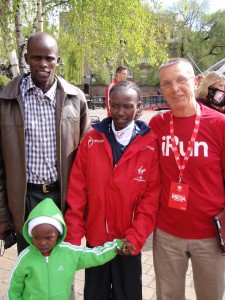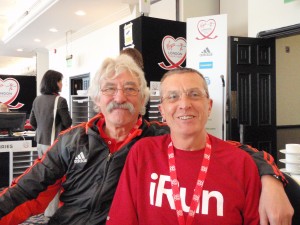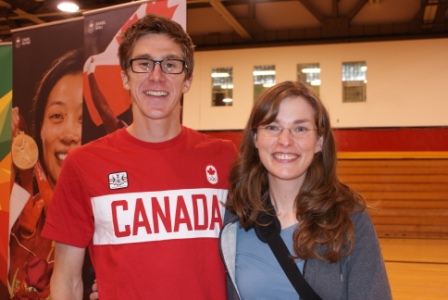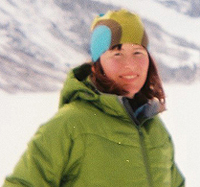The following is a guest post by Julie Drury. Check out this episode of iRun: The Running Show, where Julie chatted with host Mark Sutcliffe!
“iRun for Those Who Can’t” ~ Julie Drury
In November 2011, my four year old daughter was diagnosed with an extremely rare form of mitochondrial disease. The diagnosis marked the end of an incredible medical and diagnostic odyssey that had taken us to several top hospitals in search of answers for the first four years of her life.
Mitochondrial disease is an energy robbing disease. The mitochondria are the ‘power generators’ of the cell, and if they fail or don’t function properly cells can die. Too much cellular death and you get the failure of organs and systems in the body.
At the age of 9 months, my daughter started having bouts of acute unexplained illness characterized by an unstable heart rate, difficulty breathing, and cyclical vomiting. At the same time we had noticed developmental delay and hearing loss. As her health investigation got underway, and specialists began investigating her, other chronic and unexplained health conditions were identified. Slowly a picture of a possible mitochondrial condition was being considered and focussed on.
Mitochondrial diseases are not well known, despite the fact that they affect 1 in 4000 people. They are not rare they are just ‘the new kid on the block’. There is no known effective treatment for mitochondrial diseases and there is no cure at this time.
I have always been involved in team sport and athletics. I love to move my body and to push my limits. When my daughter became sick, I began to spend endless hours in emergency rooms, consulting with specialists and walking the floors as in-patients at the children’s hospital. It was an emotional and physical marathon.
There came a point when I knew I needed to hold onto something for me. I was giving so much of myself to care for my daughter, and my family, that I knew I needed something to keep my physical strength and stamina up, but more importantly to hold onto something for myself emotionally. Having never run a marathon before, I decided I wanted to run the Boston marathon and I selected a qualifying race.
I qualified for Boston and ran the race last spring (2011). It was one of my proudest moments in sport. I could not have done it without the incredible support of my running partners and my family.
After Boston I knew I wanted to run more marathons, and I started to hone in on a new goal – what I call Running for a Reason. I had become involved in a new Canadian charity for mitochondrial diseases, called MitoCanada. MitoCanada was started to help raise awareness about mitochondrial disease, to support individuals and families living with the disease and to raise funds for research. Then, in the fall of 2011, Team MitoCanada was formed. Team MitoCanada is a multi-sport team that participate in various races and events in an effort to raise awareness and funds for mitochondrial diseases. With the start-up of Team MitoCanada and my goal of running the marathon at Ottawa Race Weekend in May 2012, I was able to realize another goal of running for a reason.
For the past 6 months I have been organizing Team MitoCanada Ottawa, a group of runners that will participate in the running events at Ottawa Race Weekend as a participant charity. We have 63 runners to date and hope to have 100 on the starting line May 26th and 27th. Our team aims to raise over $10,000 for mitochondrial diseases awareness, support and research.
I feel so inspired by the runners I have met as I pull together this team. Some are friends and family that I know well, while others have simply heard of our organization. Some are seasoned runners having run more races than they can count, while others are running their first 5k, 10k, half marathon or full marathon. In many cases they are running in support of a cause that is new to them.
Running a distance race such as a marathon is perhaps one of the best ways to appreciate what a person with mitochondrial disease goes through. This energy robbing disease causes extreme energy loss and depletion of the systems of the body to the point where system failure occurs. For people living with mitochondrial disease, life is a marathon every day. They must push through pain and extreme fatigue everyday just to get through a regular day. It is hard for most of us to appreciate, unless we get out and run for them.
Team MitoCanada Ottawa is still recruiting runners who are registered for Ottawa Race Weekend. If you would like to run for us, we would love to have you. Please visit www.mitocanada.org/team or contact julie.drury@mitocanada.org
______________________________
If you, or someone you know, is Running for a Reason, please send your story to webeditor@irun.ca and we might feature it right here on this blog!















 Born in Nova Scotia and emigrating to British Columbia via Ontario and Alberta, Magi has been running the entire way. Primarily defined as a cross country ski racer, Magi has competed nationally and internationally in that sport. The highlight of her career was competing in the World University Games and the World Cup races in Canada in 2007. Cross country skiers rely heavily on running for cross training and Magi has become an accomplished trail and mountain runner, representing Canada at the World Mountain Running Championships in 2005 and the winning numerous national championships medals.
Born in Nova Scotia and emigrating to British Columbia via Ontario and Alberta, Magi has been running the entire way. Primarily defined as a cross country ski racer, Magi has competed nationally and internationally in that sport. The highlight of her career was competing in the World University Games and the World Cup races in Canada in 2007. Cross country skiers rely heavily on running for cross training and Magi has become an accomplished trail and mountain runner, representing Canada at the World Mountain Running Championships in 2005 and the winning numerous national championships medals. 
 Current Issue
Current Issue Previous Issue
Previous Issue Prior Release
Prior Release
